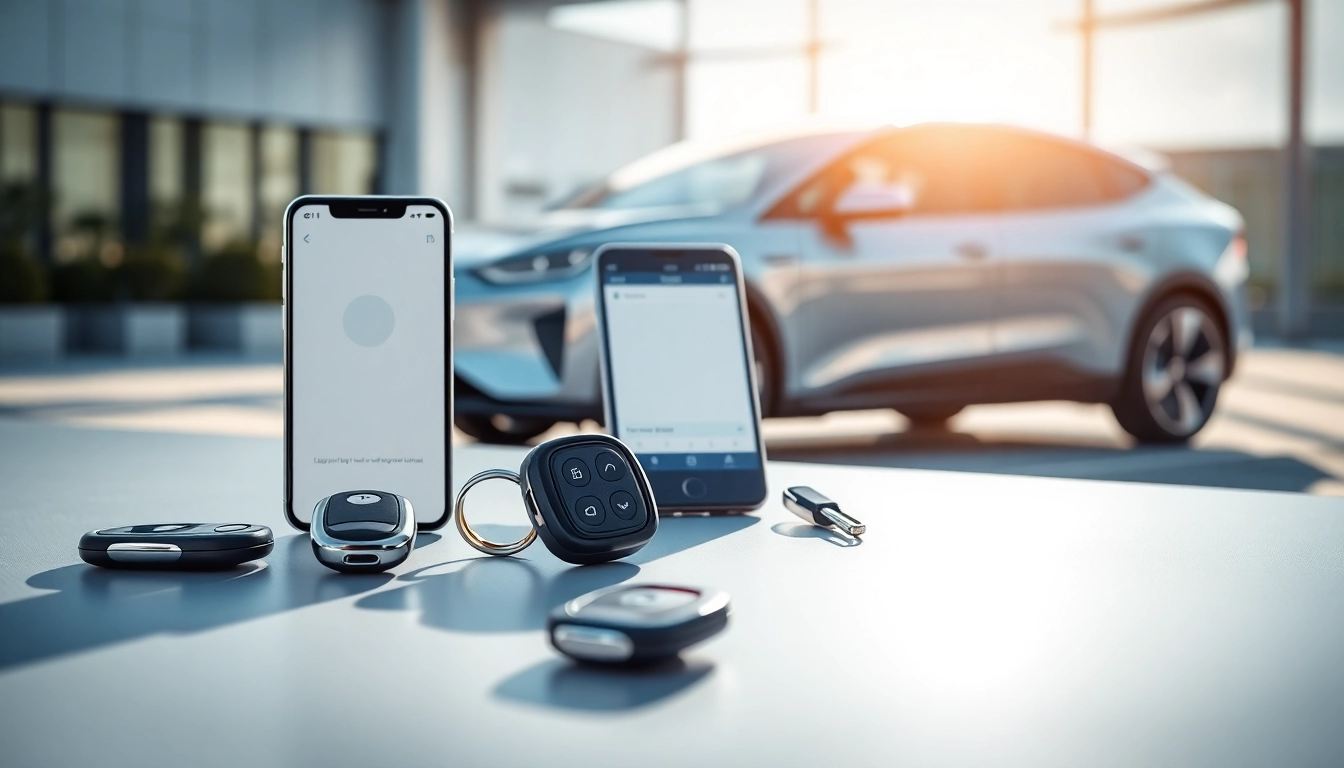Introduction to Keys for Electric Cars
The evolution of vehicle technology has fundamentally transformed the way we interact with our cars, particularly through the advent of electric vehicles (EVs). One of the most significant shifts in this realm pertains to the keys that operate these vehicles. Traditional keys have largely been replaced with advanced key management systems tailored for electric cars. Understanding the intricacies of these Keys for electric cars is crucial for every potential EV owner, tech enthusiast, and automotive professional. In this article, we will delve into the various types of electric car keys, how they work, the new technologies they employ, their benefits, and future trends in this rapidly evolving landscape.
What are Electric Car Keys?
Electric car keys are specialized access devices that allow drivers to interact with their electric vehicles. Unlike traditional mechanical keys, which are typically used to unlock doors and start the ignition, electric car keys utilize advanced technologies to offer a broader range of functionalities. These can include smart keys, digital keys, key fobs, and mobile app integrations.
At the core, electric car keys serve as the entry point for the driver to access the vehicle and control various features, albeit with increased sophistication compared to conventional keys. They not only allow for locking and unlocking but can also engage the vehicle’s systems without needing to be physically inserted into an ignition point.
How Do They Work?
The operation of electric car keys relies on different communication protocols and technologies. Most commonly, they work through:
- Radio Frequency Identification (RFID): Used in key fobs and smart keys, RFID allows the vehicle to recognize the key when it is within a predetermined range, typically enabling keyless entry and start functions.
- Bluetooth Connectivity: Many modern electric cars use Bluetooth technology to communicate with a smartphone configured as a digital key. This provides functions like unlocking doors and starting the vehicle when the smartphone is nearby.
- Mobile Apps: Many electric vehicles have associated mobile applications, allowing users to unlock, start, and manage various vehicle systems through their smartphones, essentially functioning as a digital key.
Comparative Overview of Traditional vs. Electric Car Keys
When contrasting traditional car keys with those of electric vehicles, several key differences become apparent:
- Functionality: Traditional keys often have limited functions focused solely on mechanical operations. In contrast, electric car keys can manage various settings, such as climate control, seat adjustments, and even the ability to communicate vehicle diagnostics.
- Security: Electric car keys typically incorporate advanced encryption and multifactor authentication methods, making them more resistant to theft and unauthorized access compared to traditional keys which can be easily duplicated.
- User Experience: The keyless entry and ignition systems of electric cars enhance convenience, allowing users to access their vehicles without physically handling a key, unlike traditional keys that require insertion and turning.
Types of Keys for Electric Cars
Understanding the types of keys available for electric cars opens up numerous opportunities for drivers to enhance their experience with their vehicles. Let’s explore the most commonly used types.
Digital Key Systems
Digital key systems are among the most innovative advancements in car access technology. These systems allow drivers to use their smartphones to lock, unlock, and start their vehicles. Instead of needing a physical device, the vehicle can detect the smartphone via Bluetooth or NFC technology. Once paired, the driver can perform various operations seamlessly.
Digital keys can often be shared easily. For instance, car owners might allow family members or friends to access the vehicle through their smartphones without needing to exchange physical keys. This feature is particularly useful in shared ownership situations or when lending a vehicle to someone temporarily.
Key Fobs
Key fobs remain a popular option among electric vehicle owners. Like traditional remote controls, key fobs enable drivers to perform specific tasks without needing physical contact with the vehicle. Functions typically include unlocking the doors, starting the engine, and opening the trunk. Key fobs often come with RFID technology and can be programmed to execute particular commands when within range of the car.
One of the advantages of key fobs is their robustness. They are built to withstand daily wear and tear while ensuring secure communication between the device and the vehicle. However, as technology advances, key fobs are gradually being complemented or replaced by more sophisticated digital key systems.
Keyless Entry Solutions
Keyless entry systems represent a significant leap in automotive convenience. These systems often integrate various technologies, such as passive entry and start systems, allowing the driver to unlock and start the vehicle by merely approaching it with the key fob in their pocket or bag. This technology utilizes sensors to detect the presence of the key fob and unlocks the doors automatically as the driver approaches.
A critical feature of keyless entry is ensuring that the system is secure to prevent unwanted access. Many manufacturers are implementing advanced algorithms and cryptographic measures to protect against relay theft, where a thief can amplify the signal from the key fob to unlock and start the vehicle.
Technological Innovations in Electric Car Keys
As the automotive industry progresses, numerous technological innovations are shaping the landscape of electric car keys. These innovations aim to enhance user experience, improve security, and streamline vehicle management.
Bluetooth Connectivity Features
Bluetooth technology facilitates seamless communication between electric vehicles and digital keys or smartphones. This connection allows for a range of benefits, including:
- Remote Access: Users can unlock or start their vehicles remotely, which can be particularly convenient in adverse weather conditions or when carrying items.
- Multiple Users: Owners can share key access with family members or friends, enabling multiple designated drivers without needing physical handoffs.
- Updates and Maintenance: As Bluetooth protocols evolve, vehicle manufacturers can push software updates directly to the vehicle, enhancing functionality and security over time.
Mobile Apps and Key Management
Mobile applications associated with electric vehicles have become a cornerstone of modern car ownership. These apps often serve as a digital key and provide various functionalities, such as:
- Monitoring Vehicle Status: Owners can review battery levels, mileage, and maintenance alerts directly from their smartphones.
- Remote Control: Functions like pre-conditioning (heating or cooling the car before departure), checking the charge status, and even scheduling software updates are available through these apps.
- Security Alerts: Many apps offer real-time notifications if unauthorized access attempts occur or if the vehicle’s alarm is triggered.
Advanced Security Features
The security of electric car keys is paramount, as the risks associated with keyless technology evolve. Manufacturers are continuously developing enhanced security protocols to mitigate these risks, including:
- Encryption: More robust encryption methods are being implemented to protect against hacking and unauthorized access.
- Two-Factor Authentication: Security measures like biometric recognition (e.g., fingerprint scanning or facial recognition) are increasingly integrated into mobile apps to ensure that only authorized users can access the vehicle.
- Geo-Fencing: Some vehicles can use geo-fencing technology to alert owners when the vehicle is moved out of a predetermined area, enhancing security further.
Benefits of Using Keys for Electric Cars
The incorporation of advanced key technologies within electric cars offers numerous benefits that extend beyond the fundamental operation of unlocking and starting the vehicle.
Convenience and Ease of Use
One of the most significant advantages of electric car keys lies in their convenience. Users no longer need to fumble through their pockets or bags in search of a physical key. Instead, they can simply carry their smartphone or key fob and approach the vehicle. This ease-of-use extends to functionalities like remote start and access management, making it an experience that integrates seamlessly into modern life.
Enhanced Security Compared to Traditional Keys
Electric car keys often feature a range of advanced security enhancements that provide protection against theft and unauthorized access. Unlike traditional keys, which can be easily duplicated, digital key systems often employ complex encryption techniques that are much harder to breach. In addition, features like two-factor authentication and biometric security substantially lower the risk of unauthorized vehicle access.
Integration with Smart Home Systems
Many electric car keys can integrate with smart home systems, adding another layer of convenience and control. For instance, a smart home system can be programmed to welcome the vehicle upon arrival by automatically opening the garage door or turning on specific welcome lights. This level of integration amplifies the user experience, creating a sense of connectedness that enhances day-to-day life.
Future Trends for Keys in Electric Vehicles
As we look to the future, several emerging trends have the potential to reshape how electric car keys function and are utilized by consumers. The advancements in technology and user expectations drive these trends, setting the stage for further innovation.
Emerging Technologies That Will Transform Keys for Electric Cars
New technologies are being developed that will revolutionize keys for electric vehicles. Some noteworthy trends include:
- Artificial Intelligence (AI): AI could enable smarter systems that learn user preferences, adjust vehicle settings accordingly, and enhance overall security through anomaly detection.
- Advanced User Authentication: Future keys may utilize facial recognition, voice commands, or even heartbeat synchronization for secure access, moving beyond traditional methods.
- .Blockchain Technology: Some manufacturers are exploring blockchain for secure transactions related to vehicle ownership and access control, providing a tamper-proof way to manage digital keys.
Potential Challenges and Solutions
Despite the advantages of advanced electric car keys, several challenges exist that warrant consideration:
- Technical Failures: Reliance on technology means that software glitches or connectivity issues can occasionally cause access problems. Manufacturers must institute rigorous testing and offer robust customer support to address these concerns.
- Cybersecurity Risks: As keys become more connected, they are increasingly susceptible to hacking. Ongoing investment in cybersecurity measures and consumer education on best practices will be critical to preventing unauthorized access.
- Cultural Adoption: Some users may find it challenging to transition from traditional keys to digital systems. Educational resources and demonstrations can help ease this transition.
The Shift Towards Autonomous Key Functions
The future of keys for electric vehicles may see a further shift toward autonomy. As autonomous driving technology matures, we may witness an evolution where vehicles can independently manage key functionality based on user profiles and patterns. For example, a vehicle could autonomously unlock itself as the driver approaches without requiring any interaction.
This potential for autonomous operation brings with it exciting opportunities for increasing convenience while also demanding a re-evaluation of security measures. With vehicles becoming smarter, the need for robust authentication processes will play a crucial role in ensuring safety and security in this future landscape.


